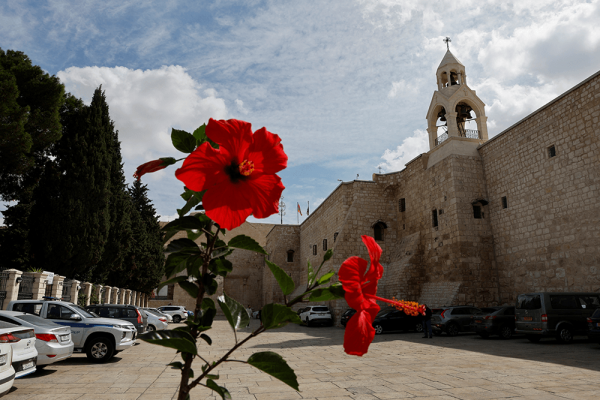At a vigil for peace in Washington, D.C., this Tuesday, Palestinian Lutheran pastor Munther Isaac spoke about the approaching Christmas season in his home of Bethlehem in the West Bank.
“How can we celebrate when we feel this war — this genocide — that is taking place could resume at any moment?” he said.
More than 150 people attended the vigil at St. Mark’s Episcopal Church on Capitol Hill as part of a larger effort by a delegation of Palestinian Christians to push U.S. lawmakers to call for a permanent cease-fire. Their visit comes amid a temporary truce between Israel and Hamas. Leaders at the event said that churches in the region have canceled Christmas celebrations this year due to the grief and devastation of the war between Israel and Hamas.
Vigil participants also heard from D.C. pastors and members of the delegation, including Isaac, who offered an urgent message of lament: “My God, my God, why did you leave Gaza?” He also expanded on the theme of Christmas. “At Christmas, we are reminded that Jesus was born on our side of the wall,” he said, referencing the barrier that cuts through Bethlehem.
Rev. Jack Sara, an evangelical pastor and president of Bethlehem Bible College, also preached at the event. Speaking about the devastation of the war, Sara offered the words of Jesus, “I have come that they will have…” He prompted audience members from each side of the sanctuary to fill in the blank. “Life, life, life,” they repeated in succession.
After speaking, Sara told Sojourners that the Christmas story — in which Jesus was born into an occupied land — reminds Palestinian Christians that Jesus is “Immanuel” or “God with us.”
“People in the Holy Land feel forsaken, feel abandoned by the church globally,” Sara said. “And Jesus stands at odds with that and is saying, ‘If everyone abandoned you, I will be with you.’”
Jesus was a refugee twice, Sara said, once when his family fled to Egypt, and later when he left Nazareth for Capernaum.
Sara said he hopes those who attended the vigil “will take our prayers with them to their churches, that they will write to their representatives, and they will be more informed.”
Event organizer David Katibah emphasized the “urgent and critical” need to hear Palestinian perspectives. Katibah, who works for the peacemaking organization Telos, said the vigil was held in part because “communities here in the U.S. have not been given the language to know how to care, how to advocate, [or] how to respond.”
The sanctuary at St. Mark’s was packed with attendees. One attendee, Abena Amoakuh, got connected to the vigil through her congregation The District Church. She came to better understand what action looks like through faith. She said she’s been disappointed by U.S. Christians’ silence in regard to the war and emphasized the importance of bringing the call to action back to Christian communities.
“Scripture calls us to [peacemaking],” she said.
The event drew particular attention to the imperiled Christian population in Gaza. Rev. Mae Elise Cannon, executive director of Churches for Middle East Peace, a sponsor of the event, told Sojourners that Christians in Gaza are “disappearing.” According to Cannon, there are less than 1,000 Christians living in Gaza, and Israel has killed dozens in their bombing campaign. During his speech, Sara said that many Christians in Gaza are now taking refuge in churches.
Cannon told Sojourners that urging President Joe Biden to work toward a cease-fire was the “number one goal” of the delegation. The Palestinian Christian leaders, who have had meetings with the White House and on Capitol Hill, came carrying a letter addressed to Biden, signed by an ecumenical group of six pastors from Bethlehem.
“We write to you in deep sorrow and pain,” the group wrote. “Enough death. Enough destruction. … This is our call and prayer this Christmas.”
When asked about how their advocacy efforts have been received, Cannon told Sojourners, “We are people of faith, and so we always have hope, but I wish that our elected officials understood the desperation of the way the Christian community feels in Palestine.”
Sara said that, in general, people have listened and shared sympathy with the delegation.
“Some were frank to say they can’t do much in light of the events, and some said they are trying to push for stronger efforts for long lasting peace,” Sara said.
Cannon said she worries about what will come after the temporary truce.
“What will survival look like if or when bombing or the ground incursion in Gaza or that violence starts back up again? They are barely surviving as it is,” she said. She recently received a text from a colleague in Gaza saying the increase in humanitarian assistance is still only a drop in the bucket.
But she said that calls for a cease-fire have strengthened during the pause “because it feels like we’re getting traction.” She said she hopes U.S. Christians would pray for all people in the Holy Land and urge their members of Congress to call for a cease-fire.
Toward the end of his remarks at the vigil, Isaac exhorted the crowd to action. “Prayer is not enough,” he said. “Now is the time for faithful prophetic courage.”
Got something to say about what you're reading? We value your feedback!








